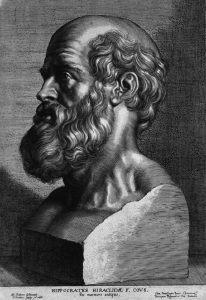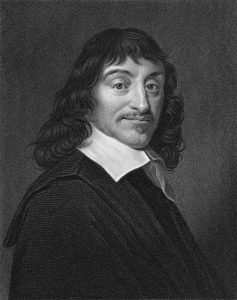Hippocrates (c. 460-377 BC)
Hippocrates maintained that diseases have natural causes arising from an imbalance of bodily fluids (humors). The Hippocratic Oath characteristics the duties and responsibilities of a physician.
Plato (427-347 BC)
Plato is responsible for the shape of Western philosophy. His place in medicine is secured through his highly influential dialogue Timeaus which links medicine, philosophy, and politics.
Aristotle (384–322 BC)
Aristotle is Plato’s successor and equal in philosophical prowess. Aristotle’s wide-ranging work introduced teleological notions in biology. He stressed observation and reported many of discoveries from dissection of animals.
Galen (AD 129 – c. 216)
Galen extensively wrote about medicine, anatomy, and philosophy within a Hippocratic framework. Galenic medicine formed the foundation of medical practice for over a millennium.
Ibn Sina (980-1037)
Otherwise known as Avicenna, he was the first scholar to present a complete synesis of Galenic medicine in Arabic. His Canon consists of five books which arranges the whole of medical science.
Hildegard of Bingen (1098-1179)
Well-known for her book Liber simplici medicinae [book of simple medicine] on the curative power of natural substances such as herbs, she also wrote on the natural causes of disease.
Paracelsus (1493-1542)
Commonly known as the father of toxicology, he pioneered a natural philosophy based on chemical principles.
Andreas Vesalius (1514 – 1564)
Vesalius wrote De humani corporis fabrica (1543) [On the fabric of the human body]. This work based on observation began the movement away from Galenic anatomy.
William Harvey (1578 – 1657)
Harvey demonstrated that the heart was a pump to circulate blood throughout the body. This overturned centuries of Galenic physiology teaching that there were two kinds of blood related to different parts of the body.
Descartes (1596-1650)
Descartes introduced the mechanical philosophy according to which organic processes are explained on par with the inner workings of clock. Descartes held that the body and the mind are two different kinds of substances, one material and the other immaterial.
John Snow (1813-1858)
Snow is considered one of the fathers of epidemiology for his discovery that cholera was a specific, water-borne disease. He questioned widely accepted miasmic theory of cholera according to which it was a poison in air. Snow’s discovery led to vastly improved water and waste systems in London.
Louis Pasteur (1822-1895)
Known as the father of microbiology, he discovered the causes of rabies and anthrax, and created the first vaccines.
Joseph Lister (1827-1912)
Lister applied Pasteur’s advances in microbiology to companion the use of antiseptics in surgery. Lister’s work greatly increased the safety of surgery earning him the honorific ‘the father of modern surgery.’
Elizabeth Blackwell (1821 – 1910)
Blackwell was the first woman to graduate from medical school in the United States. She founded the New York Infirmary for Women and Children, and published the influential book Medicine as a Profession For Women.

